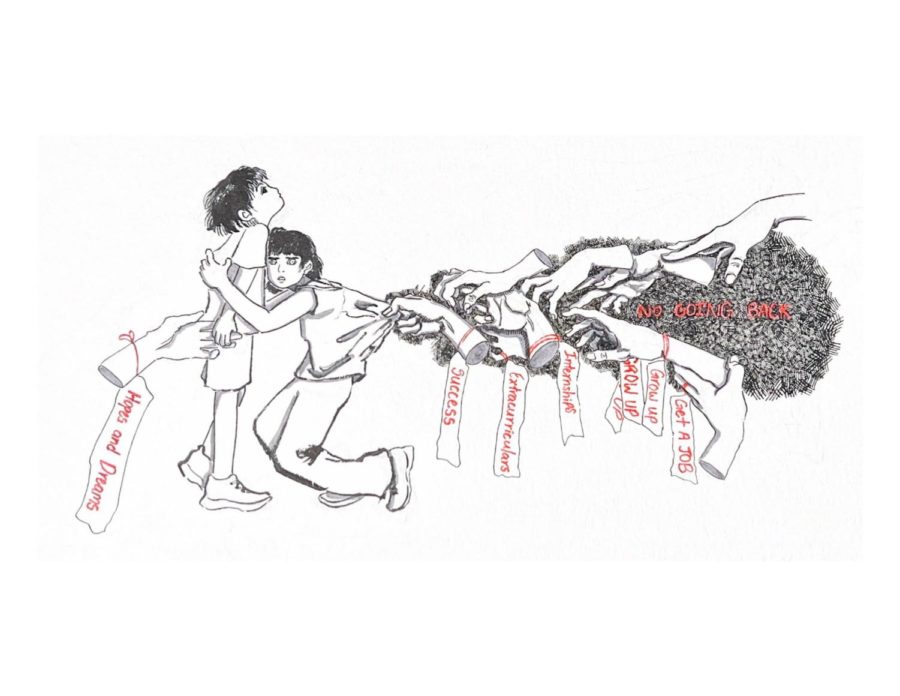Let’s rewind to O-Week. In order to facilitate this throwback, let me just sum up the standard introductory conversation: name, hometown, dorm, classes, and—if you’re feeling fancy—potential RSOs. Lather, rinse, repeat. This foolproof formula has shepherded countless first-years through first weeks and first quarters, expertly staving off the awkward silence that follows most first encounters. “I think I want to get involved with the Maroon, mostly,” I would respond to the final question. My peer would nod—a cue to elaborate.
“I mean, I wrote in high school and really enjoyed it. Hopefully I find something to write about.”
Spoiler alert: For a long time, I didn’t. In fact, an entire quarter passed with no avail. Imagine the taunting blink of the cursor on the poor excuse of a Word document you call your Hum paper, multiply that experience by 11 weeks, and you get the idea. Mind you, it wasn’t like I didn’t have things to say: I had issues, pretty pressing ones. I dreamt up my takes on self-deprecating T-shirts, dining hall health code violations, and that one manhole outside of Max East, which, I would just like to point out, is perpetually, eerily steamy.
For the longest time, I blamed writer’s block for my lack of motivation and, ultimately, inspiration. Perhaps it was true to a certain extent; being transplanted into a new environment was disorienting for me. Yet as the weeks rolled by, I felt increasingly reluctant to attribute my writer’s block to some inexplicable, reasonless entity. I couldn’t simply be stuck.
In a moment of desperation during which I may or may not have typed “asdfghjkl” for an entire page (in hindsight, I could’ve just copy-pasted it), I decided to give up writing for the quarter. Instead, I ventured into the polis of UChicago student life, stopped Tumblr scrolling and started payrolling, and at some point during the quarter ended up handing out bagged dinners to random people in the streets of Rogers Park. The night was cold, the wind dark, and for the first time in a long time I felt like I was actually doing something.
In case you have never spent hours upon hours stringing together cohesive sentences for creative purposes, let me tell you: Writing is a very passive activity. Even as I write this, I am incurring a pretty large opportunity cost by forgoing the chance to study for a midterm, work out (no pain, no gain), or embark upon the harrowing voyage to Bart Mart (no pain, no Flamin’ Hot Cheetos Puffs). Ah, the exciting options of student life!
Maybe these alternatives are a little too close to home. For, ultimately, what I am risking is something much more significant than mundanity: By sitting in front of my computer, I give up the chance to create what will become the formative experiences of my youthful years. I could go swim in Lake Michigan, wander around the South Side with nothing but a notebook and some change for the ride back, or get a tattoo of a centaur on my bicep (something my roommate has long considered). These moments brought by wanderlust are what I want to inspire my outlook.
While I would like to think that writing is purely an exercise in intellectual perspective, a library of actual life experiences can’t hurt and, in fact, may even give me an edge. Had Hemingway not fought in World War I, A Farewell to Arms would have been a very different book; if Kerouac had just bummed around New York City, we would never get to read about Sal Paradise bumming around in every other corner of the United States. Sure, I’m referencing works of fiction—these writers could conceivably have crafted their stories without experience. Yet our experiences inform our writing in a way that our thoughts cannot. They shape our personal narratives and sculpt our identities—which, for me, are the primary impetuses for writing anything down at all. I write to learn myself; yet, I can’t learn much without finding the boundaries of my actions, which only comes with experience.
As I was trying to figure out how to end this discourse on the merits of an immersive life, I ended up scrolling through some pictures from the beginning of my time at UChicago. In the fall, my house took a trip to an orchard in Indiana. After stepping off the bus and hearing a quiet punctuated by birdsong, I walked with a few others searching for warmth, which was lacking in the October fog. Hands in my jacket pockets, I soon found that the orchard only offered items of a colder nature—pulpy berries and fallen apples strewn among the dewy plash of Midwest crops. Standing in those orchard fields, the Texan in me found more solace in the stretches of flatland than in the housemates next to me. And as we wandered the rows of fruit, I wondered if that would always be the case.
If I had continued to spend hours upon hours writing, I think it might have been the case. Sitting at my desk, shunning experience, is not conducive to personal growth. For, when I merely write, all I can tell you is the tangent of what I want to do, and who I am going to be. And sometimes, that isn’t enough for you to get to know me—not even on the superficial, O-Week level.
Kristin Lin is a first-year in the College.








